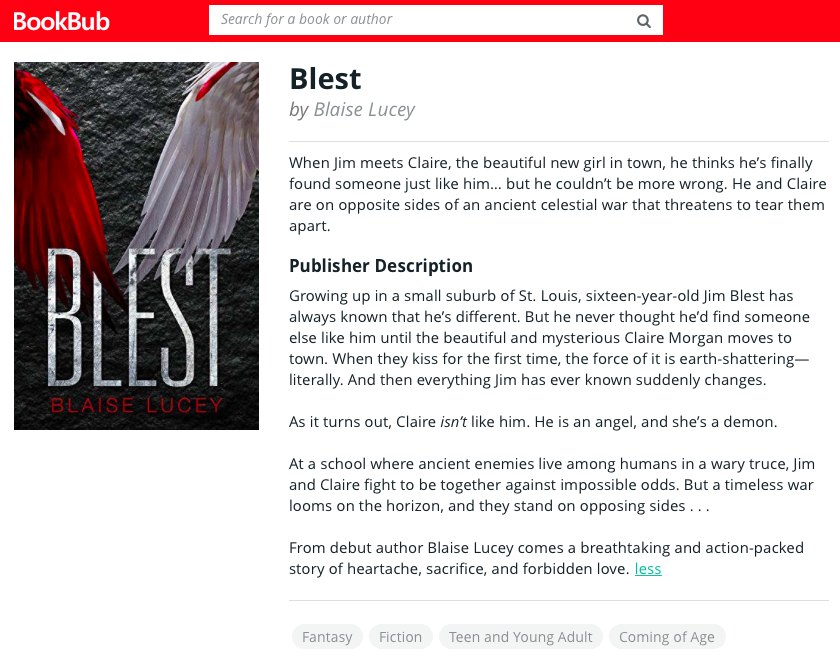
My first novel, Blest, was published last year in March. It wasn’t traditionally published, but it wasn’t traditionally self-published, either. I worked with Alloy Entertainment to outline and write the book. It’s been an interesting process, because we’re also working with the Powered by Amazon team.
Powered by Amazon takes book marketing to a new level. As a marketer myself, it’s been really interesting to see how the team has promoted Blest. Especially since I’ve been studying how books are being marketed for a few years now.
Data, Data on the Wall
Blest is a YA romance. There are fantasy elements, world-building, and a lot of action. If you’re interested in learning more about it, you can read interviews I gave about Blest here. Or head on over to Amazon!
Last year, the Powered by Amazon team started to promote Blest in emails that were specifically targeted toward YA romance readers. With Amazon’s treasure troves of user data and purchases, it’s very easy for the team there to send emails to the right people.
It was amazing to see the book climb the charts by virtue of one email promotion. It also made me think of the problems facing other publishers. Without the data to target the right readers, you can’t customize promotions the same way. Amazon, meanwhile, knows who’s reading books and they know what types of books those people read. Just by checking a few boxes to filter those groups, it’s possible to send a highly customized, highly effective email promotion.
The Bub Club
BookBub operates the same way. A Boston start-up founded in 2012 , I’ve watched BookBub with a lot of interest. The idea is very simple: sign up with your email and get book deals. Customize what kinds of books you want to see and BookBub will send you only those books.
People like this idea a lot. BookBub now has about 5 million monthly active users.
Blest was promoted in a BookBub email on Monday, April 10. So I decided to see what kind of impact these promotions had. Here are the corresponding rankings:
Monday Morning, Pre-BookBub: #93,522
Before the email went out to promote Blest, I checked out the Amazon rankings.
Blest typically would be even lower (~250,000), except the Powered by Amazon team also featured the book for a week as a half-price deal, lowering the price point from $3.99 to $1.50.
Still, Amazon rankings only mean that your book is being outsold by (in this case) 93,521 Kindle Store books. Given that the typical American only buys 12 books a year, that could really mean anything.

Monday Afternoon, Post-BookBub: #15,958
Right after the email got sent out, the ranking jumped. I don’t know how many BookBub email subscribers were targeted, but this does show that the audience is extremely engaged with the deals, to say the least.
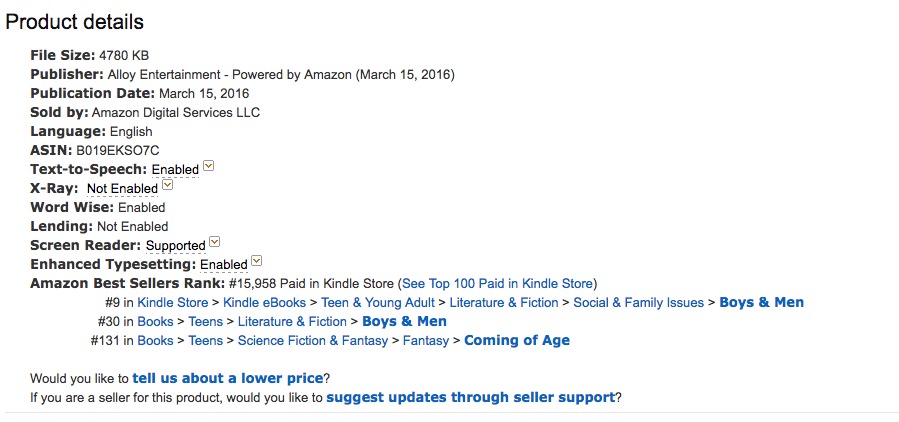
Late Monday Afternoon, Post-BookBub: #736
As people kept opening the email and buying Blest, I saw the ranking climb even higher by mid-afternoon.
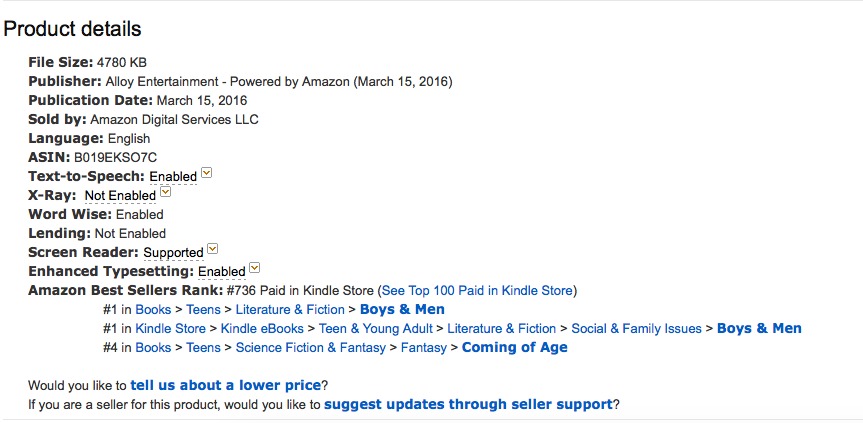
Early Monday Evening, Post-BookBub: #487
It was pretty amazing to see how high the numbers climbed by early evening. I saw the book peak at #487.
There’s a chance it could have gone a little higher, but not by much. It was cool to break into the top 500 Paid Kindle books, though, and it’s a testament to the power of BookBub promotions.
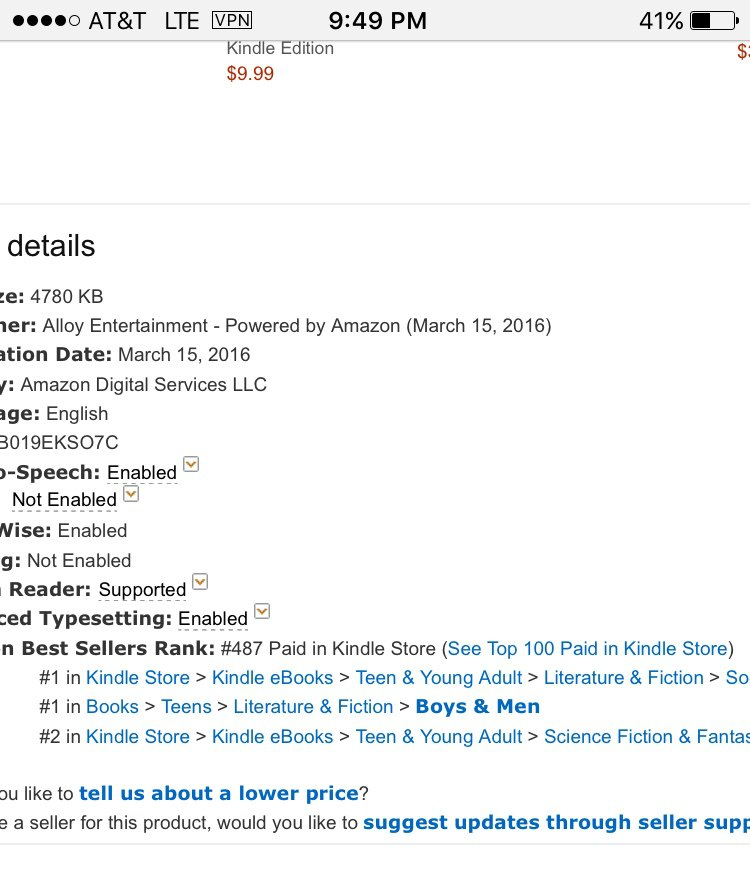 Monday, One Week Later: #4,368
Monday, One Week Later: #4,368
A week later, I can see a steady decline in rankings. I bet in another week, Blest will be back to normal. Unless everyone who did buy the book recommends it to a ton of friends and there’s some kind of persistent pick-up.
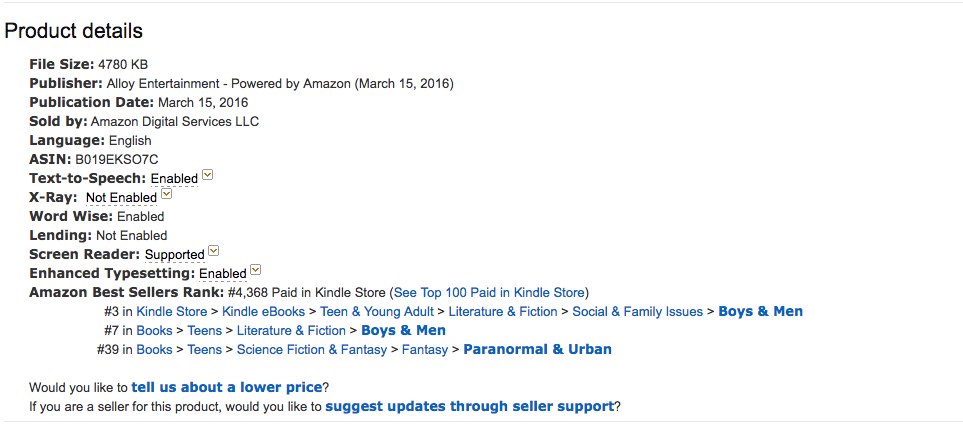
Discoverability in the Age of eBooks
There’s no doubt in my mind that the hardest part about being a writer – and a reader, for that matter – is discoverability. Finding books is hard and promoting books is hard.
On the Internet, everyone’s attention is constantly divided. It really does take something like a BookBub email promotion to target the right people… and target the right people by huge volumes. But there are caveats.
1. People buy a book, not an author.
During the promotion, my website traffic did not go up at all.

When Blest was promoted on March 10, traffic was steadily, uh, bad. That’s my fault for not posting anything about the book. But that was part of my experiment.
What we can find out from this is that readers don’t check out author websites or search for them at all. They’re buying a book, not an author. At least when it comes to eBooks.
This is an extremely important thing to keep in mind. I will rant and rave about how paying money for Facebook Ads is a huge waste for authors (also, if you’ve had success on social, please let me know – I want to be disproven). But if you don’t believe me, think about how many authors you follow and how often you check their Facebook Pages.
Books are products in a vacuum. To overcome this, you have to use content marketing with related blog posts. A great example is how this piece about gentrification made me buy a book about Brooklyn. I still don’t follow the author on Twitter.
2. People buy a genre, not the writing.
Literary fiction does not do well in the self-publishing world. Genre fiction does. Because people don’t have to research the author to figure out whether they’d like it. They know they like a genre.
That’s why Blest could be targeted with such precision. The tagged categories in the BookBub promotion are:
- Fantasy
- Fiction
- Teen & Young Adult
- Coming of Age
There are probably millions of BookBub subscribers who read these genres.
Think about this buyer journey carefully. After a summary in the email, subscribers clicked to the Blest summary page. Then they went to the Amazon page. Blest has four stars and about fifteen reviews.
Readers bought for the genre and the summary.
This was an impulse buy. It’s not too hard to risk $1.50 on a book that goes right to your Kindle or mobile device. Maybe the cover helped. But the point here is that people are making snap decisions on eBooks.
Digital book buying is not the same as bookstores, where you might stay with a book and read a chapter and put it back and see how long it is and read the back and read the front and look at the cover and blah blah blah.
You only have a few seconds to make an impression. The cover, the summary, the genres, and the reviews all matter. I bet a lot of people just made sure that the book didn’t have 3 stars or lower before buying.
3. You need to make sure there’s a ripple effect.
The ripple effect of self-publishing is how authors make their money, especially in promotions like BookBub emails. The idea is that by making one book half-price or even free, you’re attracting readers who will buy the book and then hungrily look through your backlog of books.
This tactic hinges on you already having a sequel or related novel written, published, and available.
There is no way – at all – that readers are going to come back to your page unless your book left an amazing impression. But even then, the Internet is an extremely distracting place. Even this blog post is probably too long. You might be skimming it for the bold parts, which is why I bold things in the first place.
I’m interested to see if people who bought Blest end up buying my short story collection, Technology & Culture Stink!.
I’m not counting on it. I know a lot of BookBub readers actually hoard books by the dozens. I know they get emails every day with a bunch of awesome new deals for awesome new books. Even if I see a few purchases, that’s a few more than I expect.
Chasing Waterfalls
A huge promotional boost like a BookBub email is essentially a waterfall. Readers pour over your book, but they evaporate the next day.
This is the biggest weakness in traditional publishing, too. Who’s in the bookstore? How do they decide to buy? Most importantly, how do you get in touch again?
Digital marketing depends on data to function. You want to know who’s buying your stuff, so you can stay in touch with them and let them know when you have newer, better stuff available.
Amazon does this. BookBub does this. It really, really works.
If anything, this promotion showed me how important email marketing is for every author and publisher. Email is still the best way to get someone’s attention on the Internet, especially if you’re emailing readers who bought your other books.
This BookBub promotion was amazing to watch, because it actually worked. It gave me hope about how authors can make money. And it starts with email. So if you’re planning your own book launch, think about building an email list. Don’t just pay money for a waterfall.

Leave a reply to Radhika Cancel reply